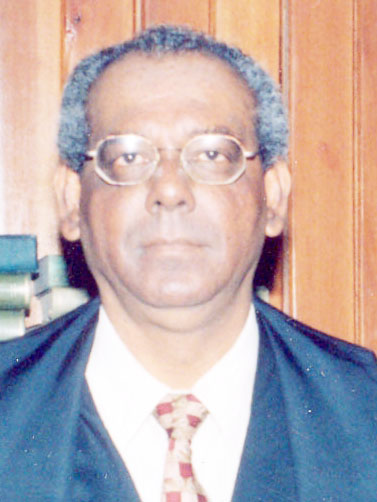President David Granger’s address to the National Assembly on Thursday completely omitted any reference to the governing coalition’s manifesto promise of constitutional reform, and former Speaker of the National Assembly Ralph Ramkarran says the AFC has the power to get this commitment fulfilled by going as far as leaving the government benches.
Writing in his weekly ‘The Conversation Tree’ column in the Sunday Stabroek, Ramkarran observed that in his speech on Thursday, Granger did not mention constitutional reform. The former Speaker said that since a budgetary provision was made, the Guyanese people were entitled to be told what legislative initiatives to expect from the Government but the public is constantly being “teased” by the Government.
“A committee was appointed to advise the Government on the process it should follow. The report was never published….Last year’s budget provided several million dollars for constitutional reform but nothing has happened. What the President did not say in his address to the National Assembly, or in previous addresses, is whether his Government will fulfil its promise on constitutional reform to the Guyanese people. It still has time to complete the process,” Ramkarran wrote.
Constitutional reform was one of the manifesto priorities of the APNU+AFC government during its 2015 elections campaign. While the manifesto promised that within three months of taking office, an APNU+AFC government would appoint a Commission to amend the Constitution with the full participation of the people, this has not occurred.
In July last year, over two years after it took office, the government tabled the Constitutional Reform Consultative Commission Bill 2017. A bipartisan Constitutional Reform Committee was subsequently established but not much has been done.
Ramkarran, in his column, recalled that constitution reform was promised by the APNU+AFC manifesto and Government. He noted that the joint manifesto of APNU+AFC provides for “Priority areas to be addressed” with the first item in this section being “The introduction of a Meaningful Constitution Reform Programme geared towards improved governance and fair representation.”
The first item in the next section entitled “Programme of Action”, was the “Establishment of a Constitutional Reform Committee with a mandate to complete consultations, draft amendments and present same to the National Assembly for approval within nine months,” Ramkarran observed. In outlining other details under the topic of “Constitutional Reform” in the manifesto, Ramkarran said that it showed the high importance that the APNU+AFC attached to constitutional reform.
However, he observed that not much has happened.
The former Speaker argued that the AFC has the power to ensure the fulfillment of the manifesto promise if it decides to do so, though he pointed out that the party has suffered serious setbacks in its relations with APNU, with the main one being the sidelining of Prime Minister Moses Nagamootoo.
“Notwithstanding the reduced influence of the AFC, manifested by APNU’s decision not to accede to its demands, whatever they may have been, in relation to the sharing of seats in the local government elections, the AFC still has clout. I made this suggestion once for the AFC to exercise that clout. I make it again. The AFC’s ministers should leave the Government, sit in the back benches, support the Government if they wish, but insist on constitutional reform in return for their continuing support,” Ramkarran wrote.
“The AFC has nothing to lose. It is destined to remain an appendage to APNU exercising little or no independent influence. The votes it gained from the PNCR in 2006, the AFC returned to APNU in 2011. And the votes it obtained from the PPP in 2011 trickled back in 2015 and has now all returned. APNU began to undermine the AFC from the day the Government took office in 2015 by reneging on promises to increase the Prime Minister’s powers. It now knows that the AFC is so weakened that it feels it can safely discard it for the local government elections,” he said.
“The only course likely to sustain the AFC as a respected, if not viable political force, is to secure constitutional reform for the Guyanese people. In addition, history will recognise this service to the Guyanese people. Its failure to do so will be held to be its failure to the Guyanese people. The Cummingsburg Accord will be recognised as a failure comparable to the failure of the PNC-UF coalition in 1968, which the PNC orchestrated. This would be just as APNU has orchestrated the failure of the APNU+AFC coalition by the miniaturisation, then absorption, of the AFC,” he observed.
According to Ramkarran, the AFC’s failure to act will open the way for a new political force to lead the way for constitutional reform, “the most important issue facing the Guyanese people today, if political stability is to be salvaged in the era of oil.”






